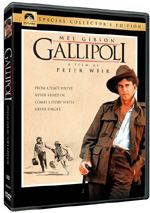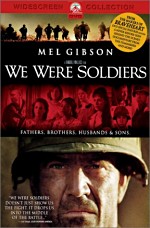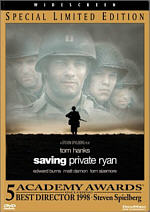|
PARAMOUNT
|

| |
|
MOVIE INFO
|
|
Director:
Peter Weir
Cast:
Mel Gibson, Mark Lee, Bill Kerr, Harold Hopkins, Charles Lathalu Yunipingli, Robert Grubb, Tim McKenzie, David Argue
Writing Credits:
Peter Weir (story), David Williamson
Tagline:
From a place you've never heard of, comes a story you'll never forget.
Synopsis:
This Special Collector's Edition DVD provides a fascinating new look into the riveting drama that is Gallipoli, the much-acclaimed film directed by Peter Weir. Mel Gibson and Mark Lee are electrifying as the two patriotic young army enlistees drawn into the ill-planned and disastrous Battle of Gallipoli in Turkey during World War I. The result is a stirring, unforgettable motion picture.
Box Office:
Budget
Domestic Gross
$5.732 million.
MPAA:
Rated PG
| |
|
DVD DETAILS
|
Presentation:
Widescreen 2.35:1/16x9
Audio:
English Dolby Digital 5.1
English Dolby 2.0
French Monaural
Subtitles:
English
Spanish
Closed-captioned
Runtime: 111 min.
Price: $14.98
Release Date: 12/13/2005
Bonus:
• “The Making of Gallipoli” Documentary
• Trailer
| |
|
PURCHASE @ AMAZON.COM
|

| |
|
EQUIPMENT
|
Sony 36" WEGA KV-36FS12 Monitor; Sony DA333ES Processor/Receiver; Panasonic CV-50 DVD Player using component outputs; Michael Green Revolution Cinema 6i Speakers (all five); Sony SA-WM40 Subwoofer.
| |
|
RELATED REVIEWS
|


| |
[an error occurred while processing this directive]
|
Gallipoli: Special Collector's Edition (1981)
|
|
Reviewed by Colin Jacobson (May 5, 2006)
Back when Mel Gibson was known only as action character Mad Max, he earned dramatic credibility with 1981’s Gallipoli. The “Max” character continued to dominate his public perception, especially since he appeared in the sequel The Road Warrior soon after the release of Gallipoli, but at least the latter showed there was more to the actor.
Set in 1915 during World War I, Gallipoli introduces us to Australian runner Archy Hamilton (Mark Lee). He craves to join the military and fight with the Australian forces in Turkey, but he’s underaged and his parents won’t support this. Nonetheless, Archy lies about his age and signs up anyway.
Actually, a local rats him out so he goes to Perth with fellow runner Frank Dunne (Gibson) to enlist there. Initially Frank doesn’t plan to join, but eventually he changes his mind. Archy latches onto the Light Horse regiment, but with no experience on a horse, Frank gets stuck with the infantry and the pair go their separate ways.
However, they reunite eventually. Frank trains with the infantry in Egypt, and both meet up again there. Archy arranges for Frank to finally transfer to the Light Horse, and they soon depart for the battle in Turkey. The rest of the flick follows the events there.
For a movie called Gallipoli, the story sure takes its own sweet time to take use there. The movie certainly doesn’t provide what I expected. I thought we’d get a better view of the Australian campaign in Turkey, whereas the movie offers almost no information about that.
Instead, it concentrates on the friendship between Archy and Frank as well as their pre-war experiences. The vast majority of the film examines those elements. Even when we get to combat, we know little of the overall picture and the combatants’ goals.
Normally I applaud films that examine a larger issue like war from the viewpoint of one or two participants. I still see Sophie’s Choice as the best Holocaust-related flick due to this decision, and that aspect of The Unbearable Lightness of Being made the film more memorable and effective.
That said, Gallipoli leaves me cold. Perhaps that’s because I don’t think we get that great a feel for the two leads. We spend a lot of time with them but they never come across as terribly three-dimensional creatures. I don’t even believe we really understand their friendship, as their attachment lacks real logic or depth. They become pals because it’s in the script, and I don’t see much more to it than that.
The long lead-up to battle should make us more attached to the characters, but I think the opposite becomes true. From its start, the film teases us with allusions to the Turkish front. It takes so long to get there that by the time it does, we don’t particularly care anymore.
Don’t get me wrong – I don’t fault Gallipoli so much for what it isn’t. Yes, I expected a film with a broader picture of the war in Turkey, whereas that side remains minor. But that’s fine, as it doesn’t need to be a large snapshot of the battle.
I just think Gallipoli falters due to its slow pace and lackluster characterizations. The misguided decision to occasionally use schlocky synthsizer music ala Chariots of Fire doesn’t help; the score is vastly superior when it sticks with straight classical music. I admire the ambition of Gallipoli and respect its point, but the end result fails to involve me.
|
The DVD Grades: Picture B/ Audio B/ Bonus B
|
|
Gallipoli appears in an aspect ratio of approximately 2.35:1 on this single-sided, double-layered DVD; the image has been enhanced for 16X9 televisions. Much of the presentation was very pleasing.
The biggest concern related to low-light shots. These tended to be rather dark and impenetrable. Blacks were fine, but shadows seemed dense and tough to discern.
Otherwise, I found little about which to complain. Sharpness usually appeared solid. Some minor softness crept into wider shots, but the majority of the film offered good definition. Jagged edges and shimmering caused no concerns, and only a little edge enhancement seemed visible.
Colors were clean and realistic, as the hues showed nice delineation. A few specks popped up at times, and a couple of early shots appeared a bit too grainy, but source flaws remained minor. I almost gave this one a “B+”, but those dark low-light images left it with a “B”.
Gallipoli featured a good Dolby Digital 5.1 soundtrack of Witness, though the mix opened matters up only sporadically. The biggest use of the audio came during the Turkish sequences, as the surrounds came more actively into play with gunfire and other warfare elements. Even some stereo material appeared in the rears at times. Otherwise, the audio concentrated strongly on the front. The score demonstrated solid stereo imaging, and the rest of the mix showed decent ambience. That was about all we got most of the time, as the pre-war setting didn’t lend itself to theatrics.
Audio quality was reasonably good. Speech demonstrated acceptably natural tones, and the lines remained intelligible. Music worked well. The score offered nice depth and range, and it came across with fine clarity. Effects didn’t play a huge role, and they occasionally seemed a bit tinny. However, they mostly sounded clear and accurate, and the smattering of louder scenes boasted good bass response. This was a better than average soundtrack for its era.
Though touted as a “Special Collector’s Edition”, only one substantial extra shows up here. Entrenched: The Making of Gallipoli splits into six parts and runs a total of 63 minutes, 50 seconds. We get archival materials, movie clips, and interviews. We hear from director Peter Weir, The Broken Years author Bill Gammage, screenwriter David Williamson, producer Patricia Lovell, executive producer Robert Stigwood, production manager Su Armstrong, camera operator John Seale, and actors Mel Gibson, David Argue, Mark Lee, Robert Grubb and Tim McKenzie. The show examines the status of Australia in the early 20th century and its involvement in World War I, research and the film’s development and scope and financing the flick. From there we learn about characters and casting, locations and set design, principal photography and its challenges, extras, cinematography, Weir’s directorial style, various production anecdotes and the reactions to the film.
The absence of a commentary comes as a disappointment, but “Entrenched” helps compensate. Over its hour, it covers the important aspects of creating the film. We get a full, rich examination of the different elements, all of which are discussed with depth and candor. The show offers a fine documentary that gives us a strong take on the production.
In addition to the trailer for Gallipoli, the DVD launches with an ad for “The John Wayne Collection”. That clip also appears in the disc’s Previews area.
Gallipoli deserves credit for its unusual subject matter and the restrained, low-key manner in which it examines things. However, it doesn’t offer enough narrative to maintain our interest over its 111 minutes, and its lack of depth means we stay at a distance from it. The DVD presents good picture and audio along with a very interesting documentary. I really wanted to like Gallipoli, but the end result never quite involved me.
|
|
Viewer Film Ratings: 4.3529 Stars | Number of Votes: 17 |
|
|

